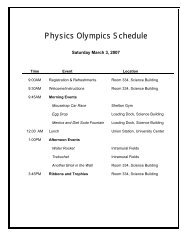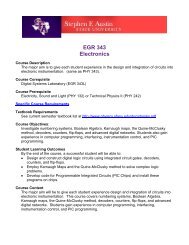Walter Trikosko - Physics & Astronomy - Stephen F. Austin State ...
Walter Trikosko - Physics & Astronomy - Stephen F. Austin State ...
Walter Trikosko - Physics & Astronomy - Stephen F. Austin State ...
You also want an ePaper? Increase the reach of your titles
YUMPU automatically turns print PDFs into web optimized ePapers that Google loves.
GENERAL PHYSICS I<br />
MEETING TIME: 10:15-12:10 MTWR, 334 Miller Science<br />
Building<br />
INSTRUCTOR: Dr. W.L. <strong>Trikosko</strong>, Department of <strong>Physics</strong> and<br />
<strong>Astronomy</strong>, <strong>Stephen</strong> F. <strong>Austin</strong> <strong>State</strong> University<br />
EMAIL: wtrikosko@sfasu.edu<br />
OFFICE: 322A Miller Science Building<br />
OFFICE HOURS: 12:10-1:30 p.m. M-R or by appointment.<br />
TEXT: Conceptual <strong>Physics</strong> (10 th edition). Paul G. Hewitt<br />
COREQUISITES: PHY 101L<br />
This course will present a broad survey of the principles<br />
of wave motion, sound, light, and mechanics and will<br />
illustrate the logic and reasoning upon which these<br />
principles are based. A great deal of emphasis will be<br />
placed on the understanding of these concepts. We<br />
hope that this course will make you aware of the fantastic<br />
natural phenomena that are occurring around you<br />
everyday. We will rediscover things that you have taken<br />
for granted and have not really paid much attention to<br />
since you were an inquisitive child.<br />
You are expected to be prepared for each lecture period<br />
by reading the material to be covered in lecture prior to<br />
attending class. This will help you to better comprehend<br />
the material given during the lecture. You are encouraged<br />
to ask questions. If you are confused about the material,<br />
I guarantee there are others with the same question. Do<br />
not be afraid to ask, I am always happy to clarify anything<br />
that is unclear and your classmates will thank you.<br />
EXAMS (450): There will be three major exams this<br />
semester in addition to the final exam. Each of these<br />
exams will count a maximum of 150 points each toward<br />
the point total. All of the exams will be taken on<br />
SCANTRON © FORM NO. 882-E. These forms are<br />
available at the bookstore, and you are expected to bring<br />
your own to the exam. You will also need a #2 or softer<br />
pencil and a very good eraser. These exams will be given<br />
on the dates indicated on the calendar and will<br />
emphasize the material covered since the last test.<br />
Students will have three days after an exam is to discuss<br />
any possible errors made in the grading, thereafter no<br />
changes will be made in the grade. The student is<br />
expected to be present for all exams.<br />
POP QUIZZES (5 points each): From time to time, at the<br />
discression of your instructor, pop quizzes will be given.<br />
These quizzes will count up to 5 points each as a bonus<br />
in calculating your final point total. To make use of them<br />
you must be present.<br />
FINAL EXAM (150): The final exam will be comprehensive<br />
with a large part of the exam over the material<br />
covered since the third exam. The final exam will be<br />
Summer I 2009<br />
worth a maximum of 150 points toward the final grade<br />
and will be given Thursday, July 9, 2009, from 10:15 a.m.<br />
– 12:15 p.m.<br />
LAB GRADE (200): The laboratory grade will count a<br />
maximum of 200 points toward the final grade (25% of<br />
the final grade). The lecture and lab grades will be<br />
combined into a single grade and the same grade will be<br />
recorded for the lecture and the lab.<br />
FINAL GRADE (800): The maximum total points possible<br />
will be 800 and a final grade will be assigned according<br />
to the following<br />
720-800 A<br />
640-719 B<br />
560-639 C<br />
480-559 D<br />
000-479 F<br />
MON TUE WED THU FRI<br />
JUNE 8 9 10 11 12<br />
19 20 21 26<br />
15 16 17 18 19<br />
X1 26 30 30&27 28<br />
22 23 24 ½ 25 26<br />
28 29 X2 2 2,3<br />
29 30 1 2 3<br />
4 5 X3 6 6-7<br />
JULY 6 7 8 9 10<br />
7,8 8,9 10 FINAL<br />
½<br />
<br />
<br />
<br />
June 24, 2009 mid-term.<br />
July 1, 2009 Last day to drop without WP or WF.<br />
July 8, 2009 Last day to withdraw from university.<br />
July 9, 2009 Final exam 10:15 a.m. – 12:15 p.m.<br />
ATTENDANCE: You are expected to be present each<br />
class day. If you miss three or more class days your<br />
grade will be reduced by one letter grade. If you come in<br />
late, please take the first available seat quietly. When<br />
you arrive late, it is very distracting to me and the other<br />
students. If you are habitually late, you will miss a large<br />
block of material. This will negatively affect you at test<br />
time and when I consider your class participation grade.<br />
If you become ill or have a restroom emergency during<br />
the lecture, please excuse yourself quietly. If you need to<br />
study for another class, the library is available. If you<br />
need to nap, that is best done at home – not in the<br />
classroom.
SUGGESTIONS FOR MAKING A GOOD GRADE:<br />
• Read your textbook.<br />
• Attend classes regularly and punctually.<br />
• Read your textbook.<br />
• Review both lecture and laboratory material daily<br />
(Don’t cram).<br />
• Read your textbook.<br />
• Participate fully in lab exercises.<br />
• Read your textbook.<br />
• Develop and practice good note taking skills.<br />
• Read your textbook.<br />
• Ask questions in class.<br />
ACADEMIC INTEGRITY: Academic integrity is a responsibility<br />
of all university faculty and students. Faculty<br />
members promote academic integrity in multiple ways<br />
including instruction on the components of academic<br />
honesty, as well as abiding by university policy on penalties<br />
for cheating and plagiarism.<br />
Definition of Academic Dishonesty<br />
Academic dishonesty includes both cheating and<br />
plagiarism. Cheating includes but is not limited to (1)<br />
using or attempting to use unauthorized materials to aid<br />
in achieving a better grade on a component of a class;<br />
(2) the falsification or invention of any information,<br />
including citations, on an assigned exercise; and/or (3)<br />
helping or attempting to help another in an act of<br />
cheating or plagiarism. Plagiarism is presenting the<br />
words or ideas of another person as if they were your<br />
own. Examples of plagiarism are (1) submitting an<br />
assignment as if it were one's own work when, in fact, it<br />
is at least partly the work of another; (2) submitting a<br />
work that has been purchased or otherwise obtained from<br />
an Internet source or another source; and (3)<br />
incorporating the words or ideas of an author into one's<br />
paper without giving the author due credit.<br />
Read the complete policy at<br />
http://www.sfasu.edu/policies/academic_integrity.asp<br />
WITHHELD GRADES POLICY: Ordinarily, at the<br />
discretion of the instructor of record and with the approval<br />
of the academic chair/director, a grade of WH will be<br />
assigned only if the student cannot complete the required<br />
course work because of unavoidable circumstances.<br />
Students must complete the work within one calendar<br />
year from the end of the semester in which they receive a<br />
WH, or the grade automatically becomes an F. If students<br />
register for the same course in future terms the WH will<br />
automatically become an F and will be counted as a<br />
repeated course for the purpose of computing the grade<br />
point average.<br />
The circumstances precipitating the request must have<br />
occurred after the last day in which a student could<br />
withdraw from a course. Students requesting a WH must<br />
be passing the course with a minimum projected grade of<br />
C.<br />
STUDENTS WITH DISABILITIES: To obtain disability<br />
related accommodations, alternate formats and/or<br />
auxiliary aids, students with disabilities must contact the<br />
Office of Disability Services (ODS), Human Services<br />
Building, Room 325, 468-3004 / 468-1004 (TDD) as early<br />
as possible in the semester. Once verified, ODS will<br />
notify the course instructor and outline the<br />
accommodation and/or auxiliary aids to be provided.<br />
Failure to request services in a timely manner may delay<br />
your accommodations. For additional information, go to<br />
http://www.sfasu.edu/disabilityservices/.


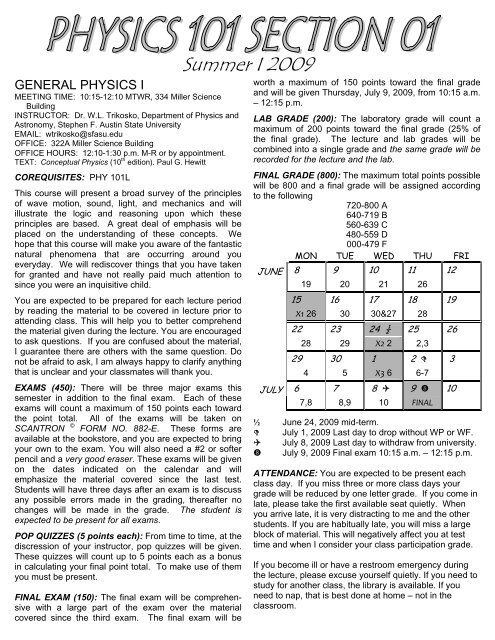

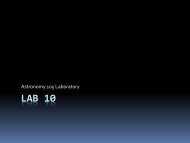
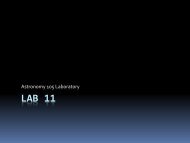
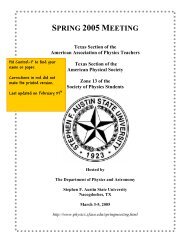
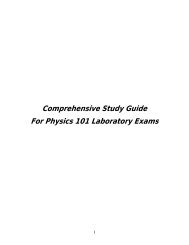
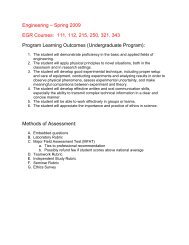
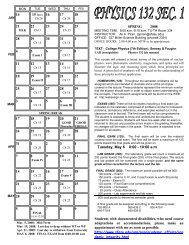
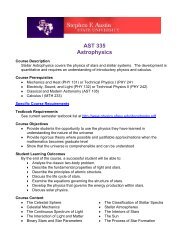
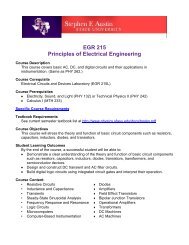
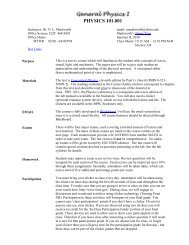
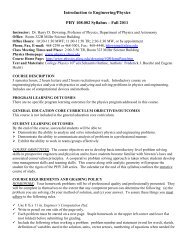
![[pdf] physics 110 fundamentals of electronics](https://img.yumpu.com/29312006/1/190x245/pdf-physics-110-fundamentals-of-electronics.jpg?quality=85)
